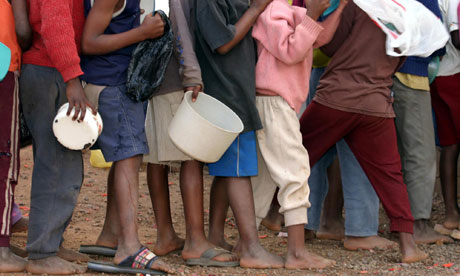
Swaziland has the miserable distinction of the highest HIV rate in the world, with more than one in four adults estimated to be carrying the virus. It accounts for nearly half the deaths of children under five.
While neighbouring countries have made inroads against the disease, the mountain kingdom of 1 million people continues to suffer setbacks, partly due to cultural norms around sexuality being exacerbated by a financial crisis.
"There are many problems in the country," said a spokesman for the Swaziland Coalition of Concerned Civic Organisations. "They're in common with the rest of Africa but they're worse here. If you look at the bell curve, we're always the outlier, for example on HIV.
"When a western NGO puts out a message about condoms, someone turns up on radio in the local language, SiSwati, and says, 'Don't be silly, our job is to produce children.'"
Research has found that, despite government information campaigns, understanding of HIV/Aids is poor. A campaign funded by the US President's Emergency Plan for Aids Relief (Pepfar) to encourage men to undergo circumcision – not a tradition in Swaziland – fell well short of its target.
But circumcision of newborn boys is proving more successful. The government has also achieved 78% coverage of people who need antiretroviral (ARV) treatment and can now conduct tests within the country instead of having to send samples to South Africa.
The gains have been jeopardised, however, by a fiscal crisis. Last year, some maternal health services were interrupted and a national HIV prevention campaign put on hold due to a lack of funds. Emergency funding from Pepfar was needed when ARV stocks ran perilously low.
A UN survey of 1,334 households in November 2011 suggested that one in four were worse off as a result of shocks such as rising food prices and loss of work. This resulted in reduced food consumption, with some families skipping meals for an entire day.
The report showed households with HIV-positive members were at greater risk and relied more on cheaper meals or skipped meals altogether. A Swazi MP claimed he had encountered impoverished patients mixing cow dung with water to fill their stomachs in order to be able to take ARVs.
At a clinic in the village of Gilgal, a sign offers services including "HIV/Aids testing and counselling" and "prevention of mother-to-child transmission".
Ncamsile Mkhwanazi, a staff nurse, said: "We have about 100 patients a week and a lot for HIV. Most are women; men don't come. Swazi men are still reluctant to be tested; we don't know why.
"HIV medication is getting better because we have drugs but the people are not using protection so they are still spreading the virus. It's still very bad."
Mkhwanazi criticised the recent circumcision drive. "Men believed that once you are circumcised you are prevented from catching HIV. It was not clear."
But she said communities were no longer being devastated as they once were. "Now people are taking the drugs so the death rate is decreasing. The government is giving enough ARVs so far but other medicines are running out. A lack of food to go with ARVs is a big problem and getting worse."
Zodwa Dlamini, 22, was in a queue at the clinic, breastfeeding her 10-month-old daughter Nomphilo, who had been suffering with a cough for three days. The family live in a mud and stick house with a thatched roof and no electricity; Dlamini has to walk three miles to draw water from the nearest river.
"I tested for HIV and was negative," she said. "I know so many people who are HIV-positive and who have died. You find couples separate when one discovers the other has HIV."
Winile Gamedze, 37, there with her baby son, Valencia, said: "There are those who still have the mentality of saying, 'No, I won't go for an HIV test.'
"I think they don't know what they are doing. It's vital to know your status so you will know what to eat."
Swaziland's life expectancy is 47.3 years for women and 43.2 for men, according to a 2011 report by Unicef and partners.

